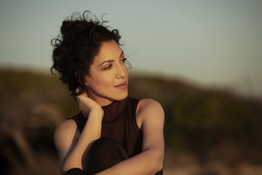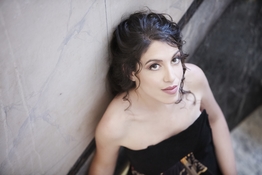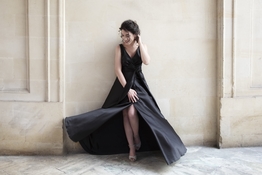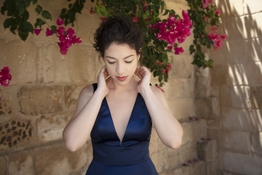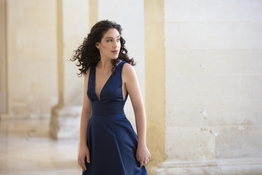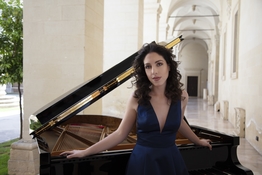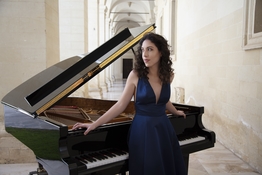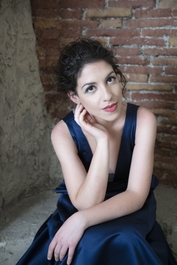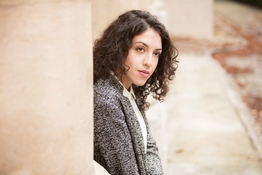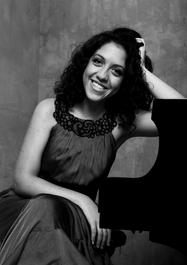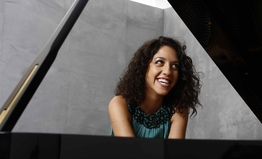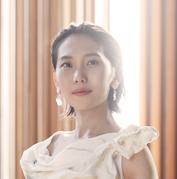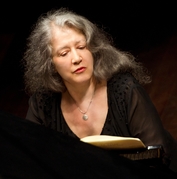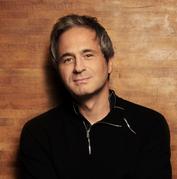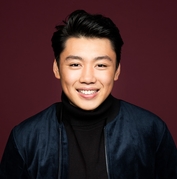

Beatrice Rana
News
Clara & Robert Schumann: Piano Concertos
Beatrice Rana, partnered by the Chamber Orchestra of Europe and conductor Yannick Nézet-Séguin, performs the piano concertos of Robert Schumann and Clara Wieck-Schumann. She complements them with Liszt’s transcription for solo piano of Robert’s song ‘Widmung’, an exuberant dedication of love, composed in the year of Robert and Clara’s marriage. The previous year (1839), Robert had written to Clara: “You complete me as a composer, as I do you. Every thought of yours comes from my soul, just as I have to thank you for all my music.”
Clara Wieck-Schumann, whose career as a major pianist lasted for more than 60 years, has long been recognised for her influence on the life and music of her husband, but also on her close friend Johannes Brahms and on the development of the piano as a solo instrument. She remains less well-known for her own work as a composer.
Since the LP era, the recording industry has frequently paired Robert Schumann’s only piano concerto with another famous Romantic concerto written in the key of A minor – Edvard Grieg’s. Beatrice Rana has chosen to programme Robert’s work with Clara’s only piano concerto (and in fact her only composition for orchestra). Not only is it also in A minor, but it predates Robert’s by 10 years: Clara, who had just turned 16 years old, gave its premiere in Leipzig in 1835 with the Gewandhaus Orchestra, conducted by Felix Mendelssohn. When Robert’s concerto was performed for the first time, in 1845 in Dresden, she was again the soloist.
Both concertos grew out of one-movement works. The final movement of Clara’s concerto, based on the dance rhythm of the polonaise, started life as a Concertstück for Piano and Orchestra (which Robert helped to orchestrate), while Robert’s was originally conceived as a Phantasie for Piano and Orchestra. The two concertos are connected by more than their common key: the coda to the opening movement of Robert’s concerto incorporates a four-note motive from Clara’s third movement, while the first movements of both concertos contain a slow episode in A flat major that bridges the exposition and development sections. There are some innovative aspects to Clara’s concerto: the three movements are linked (as in Mendelssohn’s Piano Concerto No 1, premiered in 1831) and the second movement features a duet for the piano and a solo cello.
“It was only when I began working on Clara’s concerto that I realised just how visionary this woman was from such a young age,” says Beatrice Rana. Referring to the piano-cello duet in the first movement, she adds: “She was the first to have this flash of inspiration. From the score and from all I’ve learned about Clara, it’s very clear to me that her approach to music was very instinctive. And what she writes in her concerto is so pianistically challenging that I have no doubt about what an incredible composer–performer she was. You can immediately tell it was written by someone who had absolutely no problems at the keyboard. I remember reading that, when Robert was writing his concerto, he was elaborating a particular passage as an orchestral tutti, without piano. Clara intervened and asked, ‘Why don’t you have me play there? Please, write me something!’ … She enjoyed challenges, and I think that strong personality of hers shows through in her own concerto.”
Yannick Nézet-Séguin points out that “For some time, we’ve been aware of Clara’s importance as an influential figure within the world of great male composers, but that’s where it’s important now to redress history, because she’s so much more than that. From Clara’s concerto it’s especially clear that she led the way at the beginning of their relationship, particularly with her virtuosity as a pianist, but clearly as a composer, too, she influenced Robert.” Beatrice Rana agrees that “There is some of Clara’s influence in the sheer variety of Robert’s concerto. And of course all Robert’s piano music was written for Clara’s hands, so her specific pianism must have influenced his writing a great deal.”
She adds: “I thought that ‘Widmung’ would make a perfect conclusion to this programme. To me, its text [a poem by Friedrich Rückert] encapsulates Robert and Clara’s relationship, telling of a love so incredible that it brings out in each of them ‘ein bess’res Ich’ – a better self. Clara and Robert, the two protagonists of this recording, brought out the best in each other. Robert was clearly a master composer. It’s a pity that Clara didn’t compose more, but she nevertheless practically invented my job: she was a concert pianist at a time when that kind of career was unheard of for a woman, and she had eight children! So ‘Widmung’, in its transcription for solo piano by Franz Liszt, is also a dedication from me to this great couple, who are an endless source of inspiration.”
Beatrice Rana announces a new album
“Chopin is reserved, visionary and mysterious,” says Beatrice Rana. “There are many layers to his music. It’s pleasing to the ear and sincere in its communication, but the deeper you go, the more you find …” For this album, Rana pairs Chopin’s 12 op 25 études with his four scherzi, focusing on two musical genres that the composer, combining intellect and imagination, transformed into something new.
“It was Chopin who invented the ‘concert study’,” explains Rana. “The word ‘étude’, meaning ‘study’, might lead you to expect something cold and mechanical, but instead you get a collection of pieces with an incredibly poetic flow. To me, the études seem implicitly connected, joined by a single line of expression, as if they are taking you on a journey.
“Études tend to be composed with an educational purpose, to help players improve technically. Chopin’s études focus on key elements of piano teaching, revealing a highly innovative piano technique. But at the same time, they explore original worlds of expression, gaining a new value and distinction that surpasses any studies that had preceded them. The op 25 études make sense when they are played as a set. There is an evolution to their drama.”
When the young Italian pianist performed at Zankel Hall in New York in 2019, Anthony Tommasini, the New York Times’ chief music critic wrote: “If you can play Chopin’s études comfortably, you can probably play anything written for the piano. He tried to make these études imaginative, as well, and the best performances convey their musical riches. In that regard, Beatrice Rana set a new standard for me in her New York recital debut … Playing the 12 études of Book Two (op 25), she didn’t just surmount the technical challenges; she made the pieces sound as poetic and colorful as anything Chopin ever wrote.”
In contrast to the ‘scherzo’ (Italian for ‘joke’) movements found in works by Bach or Haydn, Chopin’s scherzi are free-standing works and their mood is far from playful.
“The scherzi are evocative pieces, full of contrasts, and each has its own dignity,” says Rana. “It is easy to read stories into them, especially if you know Chopin’s diaries. They represent three distinct stages of Chopin’s life and creativity. His first, youthful phase sparkled with virtuosity. In the second phase he broke with convention and disrupted forms. In his final, mature period, he returned to classical forms but drew on everything he had discovered previously, achieving an organic synthesis.
“The first scherzo, written in 1831, is a youthful work that embodies the vitality of a time when Chopin was aiming to conquer the world as a pianist and as a composer. The second, from 1837, and the third, from 1839, both belong to a visionary and unsettled period in his life, while the Scherzo No 4, written in 1842, reveals his wisdom and maturity. It stands out from the other three for its dreamlike atmosphere ... It is both the most peaceful scherzo, and the one that breaks the most rules. While the first three are marked by extreme contrasts, the fourth is succinct and harmonious. It is no coincidence that it is the only one in a major key: it is making a different statement from the other three …”
While the études were recorded in January 2020, the scherzi did not reach the studio until February 2021. “I studied the scherzi during the first lockdown caused by the pandemic,” explains Rana. “I had no more concerts to prepare for and I thought it would help me. We live through all sorts of dramas in our daily lives, but what we find in music is very precious: it opens up a completely different world. These four pieces got so close to me. They are packed with contrasts, which I feel reflects what we have all been through in this difficult period. Music is like that: it has the power to describe our experience far more eloquently than we can ourselves.”
Beatrice Rana to perform live at the Classic BRIT Awards in London
Italian pianist and BBC New Generation Artist Beatrice Rana has been nominated for Female Artist of the Year in the 2018 Classic BRIT Awards, for her acclaimed Bach Goldberg Variations album. She is nominated alongside the outstanding Renée Fleming, Sheridan Smith, Tina Guo and Dame Vera Lynn.
Rana will perform live at the star-studded awards ceremony, which takes place at London's Royal Albert Hall on 13 June. Other special guests include Andrea Bocelli, Bryn Terfel and Katherine Jenkins.
Beatrice Rana crowned Newcomer of the Year in the BBC Music Magazine Awards
This week at the 2017 BBC Music Magazine Awards Italian pianist Beatrice Rana was crowned Best Newcomer for her critically acclaimed Warner Classics debut of Prokofiev's Second and Tchaikovsky's First Piano Concertos with Sir Antonio Pappano conducting the Orchestra dell’Accademia Nazionale di Santa Cecilia.
“I was very lucky to have the support of the incredible musician and person that is Tony Pappano,” Rana told BBC Music Magazine. “I had played the Tchaikovsky concerto in Rome and, apparently he liked it so much that he wanted me to record it with him. It was one of the biggest and happiest surprises of my life!”
The young virtuoso will also make her BBC Proms debut this season (just announced), playing the Schumann Piano Concerto in A Minor with the BBC Philharmonic Orchestra and Sir Andrew Davis. The concert, which will be televised on BBC Four, will mark the 50th anniversary of the death of Malcolm Sargent, chief conductor of the Proms from 1947 until his death in 1967. Sir Andrew Davis will recreate Sargent’s 500th Prom from 1966, highlighting his work as a champion of English music.
Beatrice Rana first came to international attention in 2011, when she won First Prize and all the special jury prizes at the Montreal International Competition. Two years later she won the Silver Medal and the Audience Award at the Van Cliburn International Piano Competition. Her exceptional achievement and promise has also been recognised by BBC Radio 3, which has named her one of its New Generation Artists, and by the Borletti-Buitoni Trust, which has awarded her a fellowship. Her new album on Warner Classics , Bach’s Goldberg Variations (“A supremely intelligent reading,” opined The Sunday Times) debuted at No 1 in the UK's official classical album chart in February.
Marianne Crebassa, Edgar Moreau & Beatrice Rana make major BBC Proms debuts
Three of Europe's finest young classical talents make their much-anticipated BBC Proms debuts in the upcoming concert season at the Royal Albert Hall.
French opera star Marianne Crebassa, recently crowned Opera Singer of the Year in France's Victoires de la Musique Classique, makes her long-awaited London as soloist in Ravel's Schéhérazade with the Philharmonia Orchestra conducted by Esa-Pekka Salonen. The young mezzo-soprano first came to international attention at the Salzburg Festival in 2012; Gramophone has already fallen for the charms of her debut album Oh, Boy!, praising her "beautiful and spirited" Mozart.
Italian virtuoso pianist Beatrice Rana, named BBC Music Magazine Newcomer of the Year in this week's award ceremony, also makes her Proms debut this season, playing the Schumann Piano Concerto in A Minor with the BBC Philharmonic Orchestra and Sir Andrew Davis. The concert will be televised on BBC Four. Beatrice is a BBC New Generation Artist. Her latest album is Bach's The Goldberg Variations.
The 23-year-old French cellist Edgar Moreau makes his first Proms appearance this summer with his regular orchestral partners, the period-instrument ensemble Il Pomo d'oro directed by Maxim Emelyanychev. They play Italian Baroque music from their album Giovincello.
Norwegian violinist Vilde Frang, who won the latest Gramophone award for Best Concerto Album with her Korngold and Britten, will perform the Sinfonia concertante from her Mozart album.
Proms favourites the John Wilson Orchestra return for their annual sell-out concerts, this time for the first European performance of the recently re-constructed stage orchestration of Rodgers & Hammerstein’s Oklahoma!. And the young, dynamic Aurora Orchestra, which has made a name for itself performing major symphonies from memory at the Proms in recent years, presents their biggest feat yet: Beethoven's Eroica.
Tickets on sale now for a lively and varied 2017 BBC Proms.
Beatrice Rana's new album climbs to #1 in the UK classical charts
For her second Warner Classics release, this week hitting No.1 in the UK's Official Specialist Classical Chart, the young Italian pianist Beatrice Rana turns to a pinnacle of the solo keyboard repertoire and a composer she has described as “my first love”: Johann Sebastian Bach's Goldberg Variations.
Her interpretation of his epic yet intimate work bears out Le Monde’s judgement that “Beatrice Rana certainly has nothing left to prove when it comes to technique, but what makes an impression are her calm maturity and her sense of architecture,”. BBC Radio 3’s Record Review programme recently commented about the album: “She’s absolutely extraordinary, she’s totally thought through the music. It might be a bit silly to talk about people like Gould and Fischer, but I think Rana is up there, she’s got something really interesting and very personal to say.”
Bach was the composer who most obsessed Beatrice Rana as a child, she confesses that it would be his music, and above all the Goldberg Variations, that she would choose if she had to devote her life to a single composer. As she has said: “I’m very happy to be going back to Bach … It’s best to avoid Bach in competitions … you can’t expose yourself to be totally killed by the jury! But Bach is my first love; now I am allowed to play it in public and I’m really looking forward to that.”
When it comes to competitions, she speaks from experience. She first came to international attention in 2011, when she won First Prize and all the special jury prizes at the Montreal International Competition. Two years later she won the Silver Medal and the Audience Award at the Van Cliburn International Piano Competition. Her exceptional achievement and promise has also been recognised by BBC Radio 3, which has named her one of its New Generation Artists, and by the Borletti-Buitoni Trust, which has awarded her a fellowship.
Beatrice Rana's Bach: Goldberg Variations is out now.
Beatrice Rana on the 'life journey' that is Bach's Goldberg Variations
Beatrice, why did you choose to record Bach’s Goldberg Variations for your second album on Warner Classics?
BR: There are many reasons. The first is that I always had a very close relationship with Bach’s music. It’s been a long time that I’ve wanted to play the Goldbergs and finally I had the courage, and I felt it was the right moment to record. My last recording for Warner Classics was the Prokofiev and Tchaikovsky concertos, and this was a physically demanding, extroverted album, and I wanted to somehow say that my pianism is not only that kind of pianism. I always wanted to play the Goldbergs and to have a recording project was a wonderful long-term project.
Why now?
If you think too much about these kinds of pieces, you are never going to play them on stage. And that’s such a pity to be a pianist, to devote your life to piano, and not to be able to play the Goldbergs on stage.
Has playing them on stage influenced your approach in the studio?
I practised the Goldbergs a lot before bringing them to the stage. And I needed a lot of reflection to make this decision. But from the first moment I played them live it’s changed. The Goldberg Variations is a very intellectual work but also a very emotional one. So when you get a chance to bring the emotional side on stage you see how people react and you feel how you yourself change. It’s always an evolution. Every performance of the Goldbergs is a different one, and I have to say it’s one of the most amazing adventures on stage I have ever experienced.
It’s a very human but also very spiritual experience. I think that the most effective reaction of the audience is the silence afterwards. That happens all the time. After such an amazing piece of music with all its architecture and details, it’s like a psychological view on yourself. The silence that comes afterwards is everything. You see that people cannot just clap right away; they need to meditate on it.
What would you say to people who think the Goldberg Variations are a bit boring, because it’s all in one key and all in this meditative mood?
It could easily be boring! It’s not variation in the sense we know it like Rachmaninov variations, that it changes and develops so much that it’s not the same work; actually the title is not even Variations, it’s Veränderungen: he takes the same harmony and structure each time. On the other hand there’s so much fantasy and imagination in the writing that it’s also very easy not to make them boring. It depends on how you see the work. I think the main misunderstanding is that it’s intellectual. Of course it is, but it’s not only intellectual.
What are the main technical challenges playing this work?
The main challenge is the hand crossing, because the Goldbergs were not conceived for piano, but for harpsichord with two manuals. So all this transcription for one keyboard creates a lot of trouble. But it’s also difficult to find enough variety of sound within the style. It’s not like finding different sounds within Romantic or modern music.
When did you first start playing them?
I started practicing them when I was eleven. Somehow the score was always on the piano and I was always taking the score and trying to practise. Finally I decided to play them seriously three years ago.
How did you get to know the Goldberg Variations so intimately?
I always played so much Bach daily – my teacher complained that I was playing too much Bach! But at some point I got far from Bach because I started playing in competitions. And in some competitions if you play Bach you’re out in the first round. There’s nothing more dangerous than playing Bach for a jury. It’s always so controversial. Some people think you cannot use the pedal or play Bach on a modern piano. I got very far from Bach. When I knew I was done with competitions, I said immediately the day after, ‘now I will go back to Bach!’ I wanted to do the Goldbergs but I was not ready, so I played some other works to warm up for the Goldbergs.
What are your impressions of the recording session?
The recording sessions over three days were very intense. With my previous recording with orchestra it was a very extroverted, powerful experience. This time I was alone with a Steinway in a room in Berlin in a nice area where there isn’t a single noise, and the studios are incredible. It was an intimate atmosphere, very concentrated, and I was lucky to have Jørn Pedersen with me, he’s an amazing producer. It’s great to have such an ear; he could tell me everything.
Do you use pedal? Do you play all the repeats?
I use the pedal. I play all the repeats, but I don’t play them the same. As a performance experience, people need the repeats to understand what’s going on, because it’s a very complicated writing. So when you listen to them with a different perspective, under another light, people can really experience the music deeply.
Which are your favourite variations?
I love Variation 13 which is the first slow major one. There are some canons that are so amazingly written. Also the last minor one, No.25, but I think that’s everyone’s favourite. Somehow the slow ones are particularly striking.
Are you an insomniac?
The Goldberg Variations make me an insomniac!
What is the message of the Goldberg Variations?
The message is different for everybody. It’s a very mixed message. On one hand you can feel it’s a very spiritual piece, but on the other hand you feel that it’s human and there’s so much joy of life. It’s amazing how these two things can coexist at the same time and be accepted by everyone, it’s the universality of this music.
Do you have a favourite recording?
When I was very young I was completely shocked by the first Glenn Gould recording, I loved Gould’s sincerity and that direct sound, his ideas are so striking. Then when I came to study the Goldberg’s closely I decided not to listen to anyone because it’s so easy to be influenced by someone else playing; I wanted my approach to the score to be the most sincere and faithful.
Which Gould recording do you prefer?
I find the first recording better than the second one, even though the second one has much more knowledge behind it. I like the freshness of the first one. He was so brave and so direct. He wanted to say ‘that’s me’. It was the Gould revolution for Bach playing. Gould will always have a very special place in my heart.
What do you think about the people who wait their whole lives to record the Goldberg Variations, when you waltz into the studio and record them at the age of 23?
All the devoted Bach players, they were never happy with one recording. And that’s because these pieces that are so big, so incredible, they need a lifetime, and I am totally aware of that. You need to start it early in order to have this journey ahead of you.
Is this work a journey?
I see the piece as a journey. And like every good journey, you don’t feel the same at the end of it.
Of course it’s a masterpiece, the kind of work you need a lifetime to discover – right now what I wanted to do was to say how I see the Goldbergs now, not only in recording but also in performance. I always consider Bach a very human composer. His genius is in using counterpoint and fugato, canons, this mathematical way of writing, to express something more profound. That’s the point of Goldberg Variations. Many people think it’s just an amazing example of counterpoint but it’s an instrument for something else. The reason it’s so important to the history of music is not the amazing writing but the message that lies behind the music. It’s important for people to forget a little bit about the intellectual part and to embrace the human part.
Beatrice Rana's Bach: The Goldberg Variations is out 24 February.
Beatrice Rana returns to her 'first love' - Bach - with the Goldberg Variations
“I like challenges,” says the 23-year-old Italian pianist Beatrice Rana. Specifically, she enjoys studying and performing music that allows her to embark on a process of deep exploration. The scores for her first Warner Classics recording, released in late 2015, were two formidable and spectacular Russian piano concertos – Tchaikovsky No 1 and Prokofiev No 2. Her performances with Sir Antonio Pappano and the Orchestra dell'Accademia Nazionale di Santa Cecilia led Gramophone to describe her as “a fully developed artist of a stature that belies her tender years”. For her new Warner Classics release she has taken on a very different challenge in the form of quieter, less obviously virtuosic masterpiece from an earlier era. It also happens to stand as a pinnacle of the solo keyboard repertoire: Bach’s Goldberg Variations.
Bach was the composer who most obsessed Beatrice Rana as a child, and in a recent interview with Pianist magazine, she confessed that it would be his music, and above all the Goldberg Variations, that she would choose if she had to devote her life to a single composer. “I’m very happy to be going back to Bach," she enthuses. "It’s best to avoid Bach in competitions … you can’t expose yourself to be totally killed by the jury! But Bach is my first love; now I am allowed to play it in public and I’m really looking forward to that.”
When it comes to competitions, she speaks from experience. She first came to international attention in 2011, when she won First Prize and all the special jury prizes at the Montreal International Competition. Two years later she won the Silver Medal and the Audience Award at the Van Cliburn International Piano Competition. Her exceptional achievement and promise has also been recognised by BBC Radio 3, which has named her one of its New Generation Artists, and by the Borletti-Buitoni Trust, which has awarded her a fellowship.
Over the 2016/2017 season, Beatrice Rana is playing Bach’s Goldberg Variations at such venues as Paris’s Théâtre des Champs-Elysées, London’s Wigmore Hall, and Berlin’s Konzerthaus, and in Aix-en-Provence, Rome, Ferrara, Vicenza, Pisa and San Francisco.
Le Monde observed that “Beatrice Rana certainly has nothing left to prove when it comes to technique, but what makes an impression is her calm maturity and her sense of architecture.” When she played the Goldberg Variations at the Théâtre des Champs-Élysées in October 2016, the Bachtrack online journal – which gave her performance a five-star rating – highlighted her capacity for turning her dazzling technique to interpretative ends and praised the way the apparently instinctive fluidity and energy of her playing was combined with articulacy and an elegant sense of discretion.
Beatrice Rana's Bach: The Goldberg Variations is out 24 February, 2017.
Artist tributes flowing in for Martha Argerich on her 75th birthday
Dear Martha,
Thank you for the great experience of making music together. It has been a privilege and a pleasure to play with you. Your great artistry was my 70th birthday present. But since now you are celebrating yours, may I wish you a very very happy and healthy birthday and many happy returns.
See you soon,
-Itzhak Perlman
My dearest Martula,
Meeting you has had a huge impact in my life – a personal, emotional and musical impact.
I was so immensely lucky to meet you – this great, fiery pianist; this living legend, this goddess of music and above all this extraordinary woman – free-spirited, passionate, curious and sensitive.
I was so excited to play with you for the first time – the Mendelssohn Piano Trio – and yet at the same time blown away, even intimidated; this young cellist fresh out of the Conservatoire suddenly face to face with a classical music giant. I will never forget the kindness with which you looked at me, and the trust you placed in me. You led me by the hand on stage with infectious energy and tenderness.
Everything I’ve experienced on stage with you and in life is invaluable. The first wild years at Lugano, the frenzy around the Gulda homage in Japan, the Beethoven Triple Concerto...
Today I’d like to tell you, once again, MERCI.
Thank you for who you are.
Thank you for your sincerity and fidelity.
Thank you for all the love you give your fellow musicians and friends.
-Gautier Capuçon
Martha Argerich has in many ways been my teacher because I have conducted my debuts with her of the Schumann Piano Concerto, the Liszt E-Flat, Prokofiev's Third Piano Concerto, Tchaikovsky No.1 and Beethoven No.1. Needless to say, once you have performed these concertos with her, it is almost impossible to imagine them played another way, such is her originality, fire, and sophistication.
May she continue to wow us all with her bewitching yet oh-so-natural way with music, and to continue offering her enormous wisdom to the younger generation of musicians...And to those of us who are not so young! -Sir Antonio Pappano
Since I listened to her playing for the very first time I immediately fell in love with her incomparable way of making music. The way she preformed evoked emotions in me that I had never felt before. I was so overwhelmed by her great naturalness, her unfailing musical instinct and her incredible virtuosity and strength that it became one of my biggest dreams to meet her in person some day and maybe even to be able to play for her.
After a couple of years, in 2010, this dream actually came true thanks to a great coincidence: at a small summer festival in Italy my great idol actually let me play for her in her practice room. Everything changed for me. From that day on Martha Argerich became my musical mentor, supported me generously and, above all, a close personal friendship started to grow between us.
Whenever she comes to visit me in Munich now and we sit together to talk and joke about music and life, these are the most inspiring and beautiful hours for me.
I am unbelievably thankful and happy to have her, for me she is the one and only; she is my 'piano mama'!
Thank you, Martula, for existing and for enriching our lives with your wonderful art. All the very best for your birthday from the bottom of my heart! Tantissimi auguroni!
-Sophie Pacini
Martha was always was my idol from childhood, and I still remember the moment I met her in Milan for the first time.
Since then I feel in love not only in her playing which is beyond any imagination, but also immense admiration for her warm, motherly and caring personality.
Sometimes I feel guilty that she does care for me so much and I have nothing to offer her...And I have to confess that getting to know her is the best thing ever happened in my life.
Happy birthday, Martha! I love you so much!
If I think to Martha Argerich one word comes immediately to my mind: immortality. Immortality because, with her overwhelming energy, she has been able to stop time and write incredible pages in the history of pianism. Best wishes, Martha! -Beatrice Rana
Beatrice Rana awarded prestigious Borletti-Buitoni Trust Fellowship
The Borletti-Buitoni Trust has today announced that Beatrice Rana is among the talented young musicians to receive a BBT Fellowship, the prestigious biennial prize helping outstanding musicians to develop their international careeres.
At just 23, the Italian pianist recently released her debut Warner Classics album: Tchaikovsky and Prokofiev piano concertos recorded with maestro Antonio Pappano at the helm of Rome's premier symphonic ensemble, the Orchestra dell'Accademia Nazionale di Santa Cecilia. In an Editor's Choice review, Gramophone wrote: "In a word? Beatrice Rana is fierce! And not only as a pianist but as a fully developed artist of a stature that belies her tender years...I can’t think of another recent concerto release that, beginning to end, affords greater pleasure."
Past winners of the Borletti-Buitoni Trust awards and fellowships include pianist Khatia Buniatishvili, violinists Benjamin Beilman and Alina Ibragimova, and trumpet virtuoso Tine Thing Helseth.
Rana has shaken the international classical music world and aroused admiration from presenters, reviewers and audiences in many countries. In June 2013, she won Silver Prize and the Audience Award at the Van Cliburn competition, bringing her to yet a new level in her already very promising career. Since September 2015 she has also been part of the BBC New Generation Artist programme.
Congratulations to all the Borletti-Buitoni Trust award and fellowship recipients for 2016.
Related releases








Upcoming Concerts
Thursday
Friday
Sunday
Monday
Tuesday







